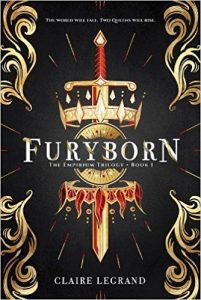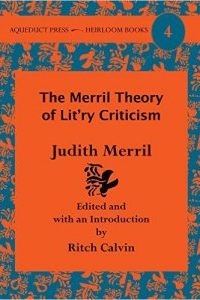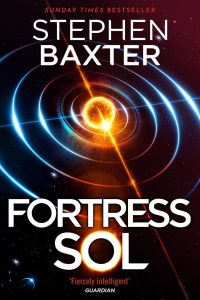Liz Bourke Reviews Furyborn by Claire Legrand
 Furyborn, Claire Legrand (Sourcebooks Fire 978-1492656623, $18.99, 512pp, hc) May 2018.
Furyborn, Claire Legrand (Sourcebooks Fire 978-1492656623, $18.99, 512pp, hc) May 2018.
Claire Legrand is the author of several novels for children and young adults. Her most recent novel is Furyborn, aimed at the YA market but with plenty that would appeal to adult readers of SFF.
Furyborn follows two young women, Rielle Dardenne and Eliana Ferracora, whose worlds are separated by a full millennium, but whose lives and perhaps destinies are intertwined.
Rielle has been raised by a distant father and a male teacher to keep her powers hidden. She possesses all seven kinds of elemental magic, an unprecedented number, and her lack of control caused her mother’s death when Rielle was still a child. Due to her father’s high rank, she’s been raised in close proximity to the royal family, and her best friend is Audric, the crown prince. Rielle’s deeply attracted to Audric – an attraction he reciprocates – but he’s engaged to be married to the Lady Ludivine, also one of Rielle’s friends and a young woman from an important family.
When Rielle and Audric secretly enter a famous horse-race in a fit of youthful hijinks, though, assassins target Audric and Rielle is forced to reveal her powers to save him, resulting in no few deaths and some rearranging of the landscape. According to the powers-that-be in her country, the only people who should have these powers are two prophesied queens. One queen will be the Sun Queen, a queen of light who brings protection and salvation. The other will be the Queen of Blood, a bringer of death and destruction. In order to prove that she’s the Sun Queen, Rielle has to undergo a series of trials to test her control and her magic. She has enemies who want her to fail, and if she fails, if the test itself doesn’t kill her, she’ll be executed as the Queen of Blood and a harbinger of destruction. Rielle’s story is told in alternating chapters with the story of Eliana Ferracora. Eliana lives in a very different society to Rielle, a society without elemental magic. There are stories about Rielle’s time, but it’s been a thousand years, so those stories are legends to her. Rielle is remembered as the woman who destroyed everything, killing her husband Audric Lightbringer, and siding with vicious angels against humanity. Not that Eliana cares about these legends: she’s a bounty hunter/assassin who, following in her mother’s footsteps, works for the oppressive and world-spanning Undying Empire, hunting down people who try to get away to the Empire’s rebels. Eliana fears the day she receives an invitation she can’t refuse to join the Empire’s elite soldiers: one day they’ll discover that she heals from injuries nearly instantly, and that she has practically inhuman endurance. Until that time, though, she doesn’t think she really has anything to worry about. Although women are going missing from her city under odd circumstances, she doesn’t think it has anything to do with her.
At least, not until her mother disappears from the house said mother shares with Eliana and her younger brother. With little choice, Eliana agrees to work with a mysterious rebel captain whose interest in her is a bit too personal, in order to try to get her mother back – but the rebel captain won’t help her unless she helps him first.
It’s pretty obvious that we’re supposed to contrast well-meaning but out-of-control Rielle – who thinks she’s the Sun Queen, and is probably the Queen of Blood – with deeply pragmatic and controlled Eliana – a woman in a hard place but still with a heart of gold, probably actually the Sun Queen and destined to save the world. Rielle has a bunch of inner darkness that she fights against. Eliana lives in a dark world, but has an inner core of… a conscience, probably. One can’t escape feeling that in terms of being adolescents facing pretty shitty choices without a lot of emotional support, they’re more similar than they’re different. (I don’t find it in me to really be on board with a willing assassin as a hero, though – at least, not one whose reasons don’t really involve much beyond the financial.)
Both Rielle’s and Eliana’s narratives are doing some heavy signalling at fairly bland romantic arcs: Rielle with forbidden-fruit-crown-prince Audric (and a mysterious male Voice In Her Head), and Eliana with mysterious-dark-past-rebel-captain Simon. In both cases, there are some indications that other women are also interested in the viewpoint female characters, though it’s possible I’m reading too much into the narrative, but the heterosexual connections are quite definitely signaled.
At this point, when it comes to stories with young women as protagonists, I’m far more interested in female friendship in the narrative, platonic or otherwise. Here, as in many other young-adult fantasy novels of recent vintage, the heterosexual romantic elements carry the distinct sense of having been bolted on, an obligatory nod to an inexplicable genre convention. There is heterosexual romance here because one must have heterosexual romance to be a YA fantasy novel. Or something along these lines; it would be nice to have a reason to believe these people are interested in each other besides the fact that they’re there.
While some aspects of the narrative are blandly familiar, Legrand’s writing nonetheless proves compellingly easy to read. The viewpoint characters, Rielle and Eliana, are interesting, as is the conceit of a narrative separated by a millennium: part of the enjoyment of reading Furyborn involves guessing at how Legrand might resolve two so widely separate (yet linked) stories. Fair warning, this is the first volume of a trilogy, and by its closing pages, very little resolution has been achieved, and none of that is on the question of how Rielle’s and Eliana’s stories intersect – besides a certain obvious connection by blood.
I thoroughly enjoyed the experience of reading Furyborn, but the more time passes, the less memorable it feels to me, either in setting or in character. I want it to stand out from the crowd, but in the final assessment, it comes out a little more bland than the shiny! new! epic! that it’s aiming for. Still, it’s a very fun book, and sufficiently entertaining that I’m going to be looking out for the sequel.
Liz Bourke is a cranky queer person who reads books. She holds a Ph.D in Classics from Trinity College, Dublin. Her first book, Sleeping With Monsters, a collection of reviews and criticism, is out now from Aqueduct Press. Find her at her blog, her Patreon, or Twitter. She supports the work of the Irish Refugee Council and the Abortion Rights Campaign.
This review and more like it in the August 2018 issue of Locus.
 While you are here, please take a moment to support Locus with a one-time or recurring donation. We rely on reader donations to keep the magazine and site going, and would like to keep the site paywall free, but WE NEED YOUR FINANCIAL SUPPORT to continue quality coverage of the science fiction and fantasy field.
While you are here, please take a moment to support Locus with a one-time or recurring donation. We rely on reader donations to keep the magazine and site going, and would like to keep the site paywall free, but WE NEED YOUR FINANCIAL SUPPORT to continue quality coverage of the science fiction and fantasy field.






